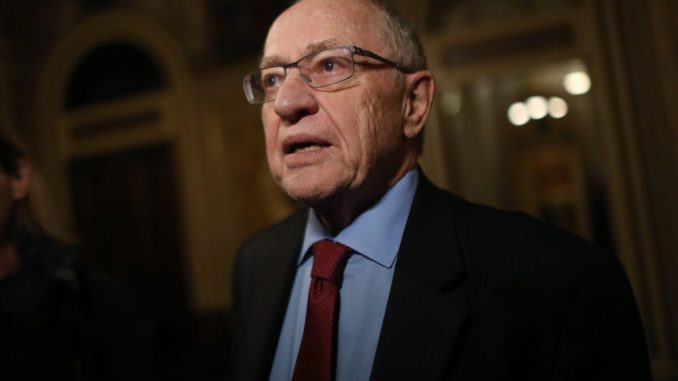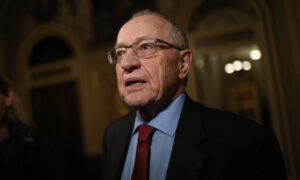

The removal of Lt. Col. Matthew Lohmeier from the U.S. Space Force this month after he publicly stated his opposition to Marxism and critical race theory is part of a broader, more dangerous new wave of censorship that is culminating in the United States, says constitutional expert Alan Dershowitz.
In an interview with Epoch TV’s “Crossroads,” Dershowitz, a former Harvard Law School professor, expressed concern over Lohmeier’s dismissal, as well as other incidents such as the removal of former President Donald Trump from Twitter, Facebook, and other Big Tech platforms in January following the Jan. 6 Capitol breach.
The Space Force on May 19 relieved Lohmeier from the 11th Space Warning Squadron over allegations that he was “politically partisan” when he denounced the spread of Marxism in the military during an interview.
In explaining his dismissal, the department said Lohmeier made “public comments” deemed to be “partisan political activity.” Lohmeier in a podcast warned about the spread of Marxist ideology within the military and the detrimental consequences of Defense Secretary Lloyd Austin’s agenda to push critical race theory.
Critical race theory, which is rooted in Marxism, has been heavily promulgated throughout academia, entertainment, government, schools, and the workplace in recent years, coming to new prominence following the rise of far-left groups such as Antifa and Black Lives Matter. Some employers have included concepts from the doctrine—which some claim teaches that the United States is a fundamentally racist country and that one race is inherently superior to another—in their “racial and cultural sensitivity” training.
Like Marxism, it advocates for the destruction of institutions, such as the Western justice system, free-market economy, and orthodox religions, while demanding that they be replaced with institutions compliant with the theory’s ideology.
The legal scholar and author of the new book, “The Case Against the New Censorship: Protecting Free Speech From Big Tech, Progressives, and Universities,” accused Democrats and Big Tech companies of engaging in censorship.
“We’re in a very, very dangerous situation now where the left, which has enormous influence on American universities, has enormous influence on social media, has enormous influence on certain kinds of politics in the media, are trying to suppress free speech, and they’re succeeding, and we have to fight back,” Dershowitz said.
Big Tech companies such as Facebook, Twitter, and Google are today engaging in “massive censorship” that endangers the freedom of speech itself, Dershowitz said.
“That’s not good for the country, it’s not good for the Constitution, it’s not good for freedom of speech. It’s not good by any standards, and it has to stop. And we the consumers have to demand that Facebook and YouTube and Twitter stop this censorship,” he continued.
Twitter executives have indicated that Trump—who had about 90 million followers on the platform—will remain suspended indefinitely, while Facebook’s “Oversight Board” ruled earlier this month to uphold his ban but set a time limit on it.
The companies have also drawn intense scrutiny for perceived political bias and alleged unbalanced moderation of users’ content. Critics say much of the companies’ moderation in the past year has unfairly targeted conservative speech and speech from individuals deemed to be supporters of Trump.
Meanwhile, groups on the other side of the aisle have been taking issue with how social media companies are operating, claiming that the Silicon Valley companies have failed to adequately address misinformation that is being proliferated online.
“What Donald Trump tweets—I may disagree with every single word he says—but he has the right to say it. And more importantly, people forget the First Amendment has two aspects, one, the right of the speaker—Donald Trump to speak—that’s one part of it,” Dershowitz said.
“But the second part, which is largely ignored, is the right of you and me the public to hear and read and see what he has to say to accept it or reject it in the marketplace of ideas,” he added. “When you ban a speaker, you also ban his viewers and listeners from having access to that speech, and that’s an equally dangerous aspect of violating free speech rights.”
Janita Kan contributed to this report.






Be the first to comment